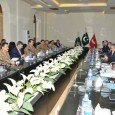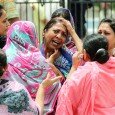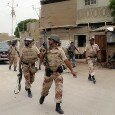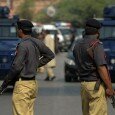By Yasir Habib Khan –
The authorities in Pakistan are still confused on the presence of ISIS in the country
After sending shiver down world’s spine, Islamic State (IS), previously known as ISIS (Islamic State of Iraq and Syria) or Daish, is now the buzzword in Pakistan. Talks run amok to fathom out that ISIS is just myth or realty. And smothering question sadly stays unanswered despite denial by government and intelligence agencies. The more people take stock of IS’s standing in Pakistan, more the questions pop up begetting wide range of suspicions and bewilderment.
From government to media even all societal arenas, IS has emerged as a big draw and even routine conversations is not left untouched with the issue of IS’s possible penetration or its near future tentacles. Debate goes berserk whether or not IS has infiltrated inside the country. Has it gained any foothold? Who are their local likeminded? Contrary to this, heated topic is that is IS just fable cultivated by non-state actors and is it just a ploy orchestrated by banned extremist groups withering due to one and other reasons to get a new lease of life?
Since confusion is at full throttle, everybody is unleashing its own fabulous theory with impunity. Every theory holds its own grounds where fake is merged into real and real gets mixed into fake so nicely that truth hardly surfaces. In foggy situation, often what is denied to be real is eye-wash and what claims to be true turn nothing.
In near past, Pakistan kept telling the world showcasing a rosy picture that Taliban never existed in the country and one day Tehreek-e-Taliban Pakistan, later Punjabi Taliban reared their ugly heads and jolted every nook and corner of Pakistan. Government always ruled out the presence of al-Qaeda head Osama bin Laden in the territory of Pakistan and one day he was killed in an important area of country. State never admitted that government authorized the drone attacks in Pakistan but later it was disclosed that under verbal agreement, drone strikes are continuing.
In IS case, state churns out the theory that Pakistan has not been bedeviled by Daish. Security analysts subscribe same the theory but not with clarity. Religious theologians carried mysterious stance. Even some clergy opt to be silent. Intelligence agencies first claim ISIS visibility and next day changed the position in a hurry.
When talked to some leaders of Jammat ul Dawa, they preferred to be zipped-lip over the issue, saying they were disallowed to comment. “We also have been directed to stay mute as policy was unclear over IS’s matter,” they added.
There are some circumstantial evidences leading to believe that IS has made some inroads in the country. Among various political party leaders, only MQM Chief Altaf Hussain warned of IS pouring into Pakistan. “Breakaway Taliban factions gear up to be member of the ISIS,” he claimed saying he was the first one to alarm Pakistan about the Taliban’s entrance in Karachi and that he was informing authorities again regarding a gigantic threat that was horrendous than the Taliban and al-Qaeda.
Meanwhile, Home Department Sindh circulated a letter to the Pakistan Rangers and Sindh Police on October 9, 2014. The letter said Waleed Alama, an Uzbek citizen, communicated Abid Kahut, a resident of Kahuta, to lead Daish in Pakistan. It also revealed about ISIS possible office near Raiwand, Lahore. “Waleed, an activist of Daish, urged Abid to launch contacts with the Tehreek-e-Taliban Pakistan and other defunct militant organizations and offered them to join the “Islamic State,” letter said.
Lahore, capital of Punjab, also felt some vibes of ISIS. Some 15 Kilometers away from Pakistan Prime Minister Nawaz Sharif’s residence, particularly in the areas of Nawab Town, Thokar Niaz Baig, Hunjerwal and Canal Road, display of posters, stickers and wall-chalking voicing for Islamic State terror group were observed.
The police came in action by taking some suspects into custody. First ever, an FIR was also registered against “unknown persons” for using static media for the propagation of ISIS and self-claimed Caliph Abu Bakar Baghdadi.
Punjab government also summoned Cabinet Sub Committee Law and Order on the issue of Daish at 8 Club Road GOR-I on October 31. Home minister Col (R) Shuja Khanzada chaired in-camera meeting attended by Chief Secretary Naveed Akram Cheema, IG Punjab, Advisor to CM Rana Maqbool, former law minister Punjab Rana Sanaullah, AIG (Special Branch), Director CTD (Punjab) and Director IB.
Minutes of meeting revealed that chair took the serious view of increased activities of Daish in Punjab. He directed to nip the evil in the bud. However, very next day another meeting held that disowned the views about Daish’s presence in the province. It hastened to clarify that instead Daish, Lashka-e-Jhangvi was behind the wall chalking, display of banners and hoisting of flags pretending to be ISIS.
Senior official in Home Department dubbed the hasty declaration as fishy and said that after thorough investigation of almost some weeks to probe everything, high-ups should have denied the ISIS’s presence. However, matter was resolved quickly. “This stokes skepticism,” he opined.
Proofs consolidate further after Jundallah, a Pakistani Islamist militant group affiliated with the Tehrik-i-Taliban Pakistan (TTP) and Jammat ul Ahrar pledged allegiance to ISIS on different occasions. As per sources in intelligence agencies, five Pakistani Taliban commanders vowed to be loyal of ISIS Caliph unearthing the fact that IS was working to gain support of hardliner Pakistani group. They said that Lashkar-e-Jhangvi (LeJ) ring leaders also held a meeting with IS leaders near Saudi-Iraq border some months back.
However, activists of Ahle Sunnat Wal Jammat (ASWJ), previously called Sipah Sahaba Pakistan (SSP) and LeJ were of the opinions that there were no formal contacts between IS and ASWJ so far. “IS has made no contact with us,” said by ASWJ chief Maulana Ahmed Ludhianvi. He claimed categorically that if anybody was found to have connection with ISIS, he would be axed from party. Maulana Ahmed Ludhianvi mentioned that ASWJ would not tolerate such elements to be vowing loyalty with IS.
Security analysts feel that IS has taken birth in Pakistan but is in infancy. It takes some time to grow and once it gains puberty, it would be more lethal than Taliban. Some experts have a view that Pakistan’s religious landscape, history and present culture is so fertile for mushroom growth of IS (Daish), known to be extreme manifestation of Wahabism or Deobandi in the country.
Security and defence analyst Hassan Askari said that IS and religious parties based in Pakistan shared long standing ideology and dream of renaissance of Islam through the rule of Caliphate. “The ideological impact is so mesmerizing that it cannot be ruled out. The clergy ideologically support IS,” he added and clarified that the overlapping ideology may be helpful for IS to gain some ground in Pakistan. However, he rejected the popular perception about IS foot in Pakistan and said that no sound clue had been found that could lead to visible presence of IS in Pakistan so far.
Almost all Sunni clerics whether they are Deobandi or not, except one or two, in Pakistan are highly impressed by the doctrine of IS as it champions two causes—rule of caliphate and wipe out world with infidels (non-believers). Another common ground is hate against America, believed to be involved in crushing Muslim being staunch ally of Israel. They observe that after al-Quaeda, ISIS is one and only power that comes all out to challenge the hegemony of US. So much so even mainstream religious parties disdain democracy and want Islamic Shariya as system to run the country.
Pakistan is rife with followers of Deobandi or Wahabism. This sect is among those Sunni sects that never eschew to use violence to impose the rule of Sharia and renaissance of Caliphate. Almost all Talibans affiliate to Deobandi. The biggest congregation of Deobandi is always held in Raiwind, This religious gathering is branded as second gigantic Muslim gathering after Haj. As Deobandi is also called as anti-Shia group, banded organizations SSP, LeJ etc. are hell-bent to raze out Shia followers, got fascinated to Deohandis and now IS.
If history traced back, fact surfaces that they were Deobandi leaders who carried out Silk Letter Movement (Tehreek-e-Reshmi Rumal), to rejuvenate Ottoman Turkey, last stand of Caliphate. Famous Muslim leader Maulana Muhmmad Ali Johar launched Tehreek-e-Khilafat. Later Hizb ut Tahrir, that works for goal of all Muslim countries unifying as an Islamic state or caliphate ruled by Islamic law (sharia) and with a caliph head of state elected by Muslim. Hizb-ut-Tahrir, banned organization in Pakistan, is learnt to have some roots in Pakistan Army.
Ali Khan, once serving brigadier in Pakistan Army, was nabbed in May 2011 for links with Hizb-ut-Tahrir (HuT). Now-a-day HuT is operating with the name of Soot-ul-Umma led by some retired army officials. HuT and IS shares same flag used by Muslim Caliphs. Flag has black background bearing Kalma with white color.
Inspired by Mullah Umer’s Taliban government in Afghanistan, Sufi Mohammed, a religious Swat leader established a Shariya government in Swat that was later ousted by fierce army operation. In another incident, radical administration of the Lal Masjid, or Red Mosque, the pro-Taliban mosque in the heart of Islamabad tried to enforce sharia by force.
Jammat-e-Islami (JI) founded by Maulana Abul A’la Al Moududi and Tanzeem-e-Islami founded by Dr. Israr Ahmed have strong theology to bring back the glory of Islam through rule of Caliphate. Both parties underlined the need to launch Jihad raising the power of sword. Both hold America responsible of all oppression against Islam.
Recently, JI former president Manwar Hassan during his public address at Minar-e-Pakistan on November 22 called for launch of Jihad and killing for the sake of Allah as solution for all problems. He also flared up controversy last year by declaring Hakimullah Mehsud of Tehreek-e-Taliban Pakistan (TTP) and his associates killed in the drone strike as martyrs and did not sympathize for army officers killed in terrorist attack.
Markaz-e-Jamiat Ahl Hadith leader Ibtisam Elahi Zaheer endorsed the idea of sharing similar religious ideological boundaries by Pakistan religious parties and IS. “Both also believe in Caliphate and US as sole enemy and the joint approach carried its own weight,” he said. Anyhow, Ibtisam Elahi Zahir mentioned that how much IS had penetrated and how much it had been linked up here, it was premature to say anything with conviction.
“If Afghanistan situation makes wrong turn and get worse, it will carry spillover effect on Pakistan and the chaotic circumstances would help radical elements to join hand with IS,” defense analyst Talat Masood warned. On a query, he categorically denied the IS standing in Pakistan at present. He said that IS was busy in Syria and Iraq. Pakistan was not focus for it, he added
Some security personnel in CID did not thump up the mantra that IS established any link in Pakistan. They termed the wall-marking and display of banner to propagate IS’s message as heinous work of banner outfits.
After investigation, we get to know that activists some banned extremist groups like LeJ, Jammat ur Ahrar held some meetings at Ichrah and Wahdat road last month. They tried to use the title of IS for to gain fake popularity and get new lease of life. Since they were rounded up, none wall-chalking had been witnessed, they claimed. DIG operation Haider Ashraf also held defunct organizations responsible for suspicious IS wall-chalking.
What go against Daish in Pakistan is writ of army and love for democracy by people. Unlike Iraq and Syria Pakistan army has won to enforce rule of state in areas once occupied by the terrorists — like NWA, SWA and Swat. Recently Chief of the Army Staff (COAS) General Raheel Sharif announced not to let Daish — or the Islamic State (IS) flourish in Pakistan.
About ghost followers of IS in Paksitan, Jamiat Ulema-i-Islam Maulana Samiul Haq, staunch supporter of Taliban chief Mullah Umer, clarified that Daish did not exist in Pakistan. “US and West are attempting to project Daish in the country through wall chalking,” he said.
Now all eyes are on IS’s activities if finding some space in the territory of Pakistan. No one but time is the sole judge to verify whether ISIS has built up some links with local radical elements or it is merely part of conspiracy theory.
The writer is a journalist based in Lahore






























































































